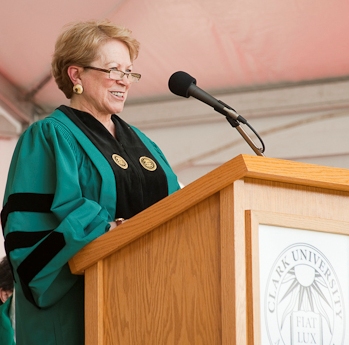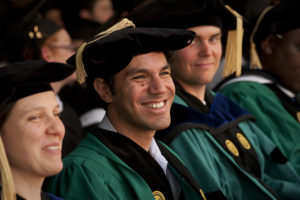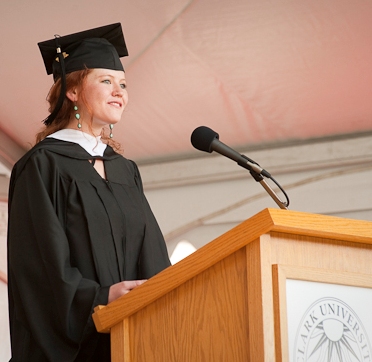Clark University celebrated its 108th Commencement on Sunday, May 20. Degrees were granted to 1,092 graduates: 546 baccalaureate, 520 masters, and 26 doctoral. Carol Geary Schneider, the president of the Association of American Colleges and Universities (AAC&U), delivered the Commencement address. AAC&U is the leading national organization devoted to advancing and strengthening undergraduate liberal education.

Schneider talked about the AAC&U’s Liberal Education and America’s Promise (LEAP), a public-advocacy and campus-action initiative designed to engage students and the public with what really matters in a college education for the 21st century. She noted the link between LEAP and Clark’s LEEP — Liberal Education and Effective Practice — which is a pioneering model for higher education that integrates classroom learning with authentic engagement in the world and workplace.
Schneider acknowledged that some pundits have questioned whether a liberal arts education is still a smart choice in this economy. She told the graduating class that, through surveys and focus groups, she has learned that “employers place very high value on the big-picture thinking and the strong intellectual skills that a Clark University education provides.”
“Employers are looking for people…who have strong communication skills, who can write well, who can speak well, who have excellent critical thinking skills, who have research skills, problem solving skills. They care a lot about diversity and they want to know they are hiring people that not only can work with, but are positioned to learn from, those whose experiences and world views are different from their own,” she said. “All of these have been fundamental to your undergraduate and graduate education at Clark.” Schneider said employers want employees who are informed global citizens with a “360-degree perspective,” and who attack problems from many different angles. “People just entering the economy need to be able to hit the ground running in cultures where innovation and change are 24-hour commitments,” she said.
Schneider received an honorary Doctor of Humane Letters degree during the Clark Commencement ceremonies. In his introductory remarks Clark President David Angel told the graduates, “We are confident that you, our graduates, will challenge convention and change our world for the better.”

President Angel also recognized faculty members Carol D’Lugo, Jim Laird, Lee Rudolph, and Maurry Tamarkin, whose official service as teacher-scholars ended this year. Senior speaker Laura Hansen, of Paraguay, who received a bachelor of arts degree, delivered an impassioned speech about empathy, which she said distinguishes Clark as a school and as a community. “When we see others struggling, and resolve to help them through solidarity and awareness, we practice the empathy necessary for us to flourish as a community. This mentality is fostered at Clark,” said Hansen. Hansen spoke of how adaptable Clarkies are, and how her class has a “rich multicultural mix.”

“We have become adept at understanding where others are coming from, accepting these differences and not only building off of these dissimilarities, but finding a common ground as well.
In a world that is increasingly international and increasingly defined by social networks, this is a valuable skill,” she said. Clark conferred two honorary Doctor of Humane Letters degrees to the following distinguished leaders: Ian Smillie was the founder of the 50-member Kimberley Process, whose goal was to sever the connection between “blood diamonds” and the rebel groups they financed.
A founder of the Canadian NGO Inter Pares in 1975, he also was executive director of CUSO from 1979 to 1983. He is author of “Blood on the Stone: Greed, Corruption and War in the Global Diamond Trade” (2010) and “Freedom from Want: The Remarkable Story of BRAC” (2009).
Smillie is a leader in the campaign to end blood diamonds. He chairs the Diamond Development Initiative and he is a member of the Order of Canada. William S. Mosakowski founded Public Consulting Group (PCG) in 1986.
He serves as president and CEO of this privately held consulting firm that serves state and local health and human services programs and employs nearly 950 professionals in 35 offices around the United States, Canada, and Poland. Before starting PCG, Mosakowski served as assistant revenue director for the Massachusetts Department of Mental Health and Mental Retardation, as manager of reimbursement for the Harvard Community Health Plan, and was a senior consultant with Touche Ross & Company.
He is a former chairman of the Clark University Board of Trustees. He and his wife Jane Mosakowski, both alumni of Clark, are the founding benefactors of the Mosakowski Institute for Public Enterprise at Clark. Dr. Donald M. Berwick received an honorary Doctor of Science degree during Commencement exercises.
Berwick is clinical professor of pediatrics and health care policy in the Department of Pediatrics at the Harvard Medical School and professor of health policy and management at the Harvard School of Public Health. He is also a pediatrician, adjunct staff in the Department of Medicine at Children’s Hospital Boston, and a consultant in pediatrics Massachusetts General Hospital. Berwick was co-founder and co-principal investigator for the National Demonstration Project on Quality Improvement in Health Care. He co-founded the Institute for Healthcare Improvement in the late 1980s, and worked there for nearly 20 years. He is former director of the Centers for Medicare and Medicaid Services under the appointment of President Barack Obama.
